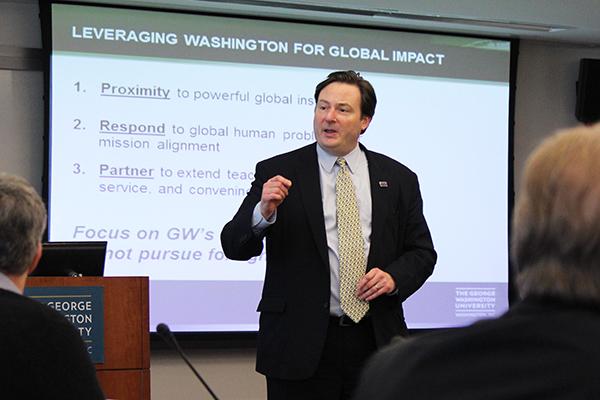The University wants to give international students more resources on campus.
Doug Shaw, the senior associate provost for international strategy, said officials are “exploring new ways to make resources available for enhanced international student services,” after faculty noted minimal options for international students during a Faculty Senate meeting this month.
Faculty said GW’s goal of doubling its international student population to 15 percent of the undergraduate population and 30 percent of the graduate population by 2022 could be hard to achieve with the resources currently available to support international students on campus.
Over the last few years, officials have expanded resources for international students, hosting more career networking events and giving every student an adviser to provide guidance on academics and the visa process. But faculty say the University needs to do more to help international students acclimate to GW after their paperwork is completed.
Enrolling more international students is part of the University’s strategy to expand its global footprint. International students are a financial boon to the University, since most don’t receive financial aid, and they also help the University gain recognition around the world.
Kathryn Newcomer, the director of the Trachtenberg School of Public Policy and Public Administration, said at the Faculty Senate meeting that the International Services Office, the primary resource center for international students on campus, only helps with student visas and doesn’t do enough to help international students settle in on campus.
“What I fear is, the more of these students we get here, and the more they find out that there’s no support for them, we will get a bad rap,” Newcomer said. “Then the word on the street is, ‘Don’t go to GW. There are no student services for you.’”
In response, Shaw said he was in “active discussions” with Interim Provost Forrest Maltzman about improving services for international students.
“Every time we talk, we talk about that,” Shaw said at the meeting.
Ishaba Haque, the director of international students for the Student Association, said the International Services Office should primarily focus on making sure international students have proper documentation.
“There’s no way that international students could stick around if they weren’t monitoring legal status and making sure all the paperwork was right, so there’s absolutely nothing wrong with that,” she said.
The GW School of Business has focused its efforts on international students visas recently, working to identify employers outside of D.C. who will hire international students and sponsor their work visas.
Still, Haque said the office would need more resources and staff if the University wants to successfully accommodate a surge in international students. Currently, 11 people are listed as staff on the website.
She added that the office does try to help international students feel comfortable at GW, like by planning Capitol tours and trips to see cherry blossoms in the spring, but she hopes to see officials plan more programming on campus.
“I would want to see them do galas and create more networking opportunities,” Haque said. “One of the biggest goals for international students, like all students, is to find a job at the end of college.”
Currently, the Center for Career Services hosts events on building resumes and cover letters specifically for international students, as well as special networking sessions.
This year, the Center for Student Engagement began hosting monthly dinners and special office hours for first-generation students.
International students said the lack of staff at the International Services Office creates a problem for students who need swift help.
Isaac Fuhrman, the associate director of the International Students Community, said it took the office two weeks to complete paperwork for an internship that began within one week.
Fuhrman said the International Services Office shouldn’t be blamed being understaffed and underfunded, but “you can’t really bring more students if you don’t have the resources to take care of them.”








